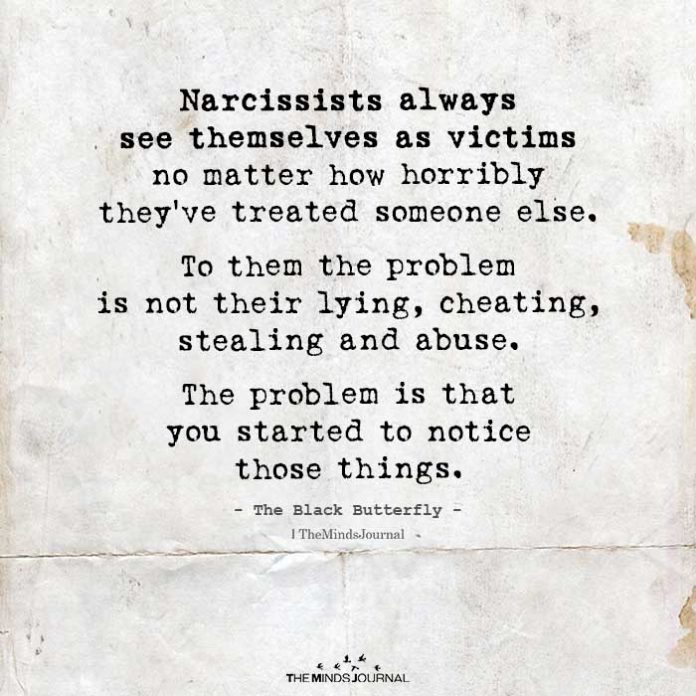Dealing with a narcissist is probably one of the toughest things we face in our lives. Narcissists are people whose world only revolves around themselves. It’s always, ‘I, me and myself’ for them. They cannot look beyond their internal world and think about others around them.
“He’s satisfied with himself. If you have a soul you can’t be satisfied.” ― Graham Greene
A human being might have narcissist traits but it’s not necessary that they should be a narcissist.
A lot of experiences, usually bad conspire in the making of a narcissist person. While it’s really easy to avoid them and shun them away from our lives, knowing the proper ways to deal with them can also add love and positivity in our lives.
Before going on to the details of the ways of dealing with a narcissist, let’s understand how to identify a narcissist.
Related: What It Means When a Narcissist Says “I Love You”
How To Identify A Narcissist
A human being with narcissist tendencies might not be a narcissist. A narcissist will have all or many among these following traits:
(1) Lacking empathy: they are self-obsessed and they don’t care what’s happening to others.
(2) Zero insight into their own actions: they are always right and they need constant compliments and appreciation for everything. If you want to talk to them, you need to flatter them first before getting their attention.
(3) Manipulative: if the conversations aren’t about them, they would always turn them at their own directions or avoid them; they would always make you do things which will benefit none but themselves and in order to get things done, they will never get ashamed of playing the victim.
(4) It’s always about them: everything ends up to be about them.
Related: Are you a psychopath? Lets see if you Can You Pass This Test
If the person you are dealing with is a narcissist, then it’s important you figure out the reasons you need to be with them. In understanding your relationship with the narcissist, just make these points clear to yourself:
(1) Long-Term relationship: If the narcissist person is someone you love and it’s very difficult for you to leave them, then you need to realize that you are going to have a long-term relationship with a narcissist.
(2) Short-term relationship: If you need to deal with a narcissist person for a short period of time, probably at work or in your social circle, then it’s a short-term relationship and you can behave accordingly.
(3) Self- protection: No matter what is the type of relationship you have, you need to protect yourself from their narcissist traits. Make sure that you don’t get abused or become their victim.
(4) Understanding your own limits: You only know how much you can tolerate. Narcissists drain people in all possible ways. So, be giving but also remember that you can’t get exhausted. In that case, you will be causing harm to yourself.

Related: Signs You’re Arguing With A Psychopath
Ways to Deal with a Narcissist
Situation 1 – When in long-term relationships:
(1) Accept them the way they are:
Remember you cannot change a narcissist. You need to stop expecting from them. If they don’t show the love or care, don’t expect them or try to force them to do so. This will turn things bitter.
(2) Understand their insecurities:
Narcissists are insecure people and this is why they need validation from others. Understanding the areas they are insecure of, you can realize the reasons they are behaving in certain ways. It will help you in better communication.
(3) Know that you are worthy:
Self-love and self-care is very important. A narcissist is prone to abuses. Don’t let those words affect you. You know what you are capable of. If you feel like losing your self-worth, try and reach out to support groups.
(4) Be careful with your words when you talk to them:
Since narcissists are prone to be manipulative and use people for their own benefits, be careful with your secrets and vulnerabilities. They might turn them against you.
Related: 5 Things Sociopaths and Narcissists Say to Make You Feel Crazy
Situation 2 – When in a short-term relationships:
(1) Avoid any form of manipulation:
Don’t let yourself get manipulated by the victim blaming. Narcissists are also good liars. So, avoid the mind games.

(2) Don’t sugar-coat them, say only what you feel:
It’s hard to please a narcissist. So, if you praise them, praise from your heart, not because you need to flatter. Be genuine with your words.
(3) Smile away:
Often the best ways to deal with a narcissist is smile and just nod to whatever they are saying. A narcissist wouldn’t even care to listen to you. So, be in their good books simply by smiling.
(4) Be a good listener:
Narcissists are constantly seeking attention. They need someone to listen to them patiently. If you have a friend or a colleague who is a narcissist, just listen. Listening is a good way to deal with a narcissist.
(5) Be open with your limitations:
There are things you cannot do for someone. Be clear with your limitations and place them with modesty without arguments or showing any outburst.
(6) Convince them that whatever you are doing is best for them:
The best way to convince and deal with a narcissist in doing the things you want them to be is showing them the ways it will benefit them. A narcissist is willing to do anything for that.
(7) Criticize in a very cordial way:
Remember, a narcissist cannot tolerate negative criticisms. If you have to tell them something negative, tell them in a good way with logic and examples and solutions for improvement.
Situation 3 – Staging An Intervention in The Narcissists Life
Sometimes when a narcissist is someone you cannot avoid, someone you love, a dear one or someone you want to help, Staging an Intervention is necessary and crucial for both of you.
Convincing a narcissist that something is wrong is next to impossible, but if you plan it the right way, he/she might see things the way they are. Most of the times the best outcome to an intervention is when the narcissist has gone through a life changing event or trauma. This is the time when they are the most human’ version of themselves and are ready to listen’
Related: The Toxic Attraction Between An Empath And A Narcissist
The ways you can plan an intervention are:
(1) Talk to a professional and be open about everything that has happened. A professional counsellor will guide you.
(2) Get a few more people who are close to the person and together, try to convince the narcissist.
(3) Making the narcissist understand that it’s for their own good and that they are hurting themselves will make things easy.
Narcissists are usually good people gone bad. We can either leave them or make them live. It all depends on us on what we want to do.










Leave a Reply
You must be logged in to post a comment.